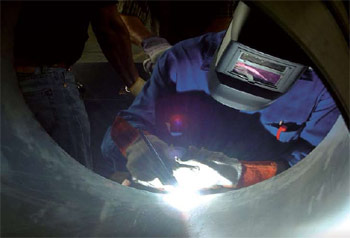 |
 |
 |
|
April - May 2008
|
 UWI Researchers invent electronic “PHI”-panPHI is the second innovation coming out of the UWI LaboratoryPan Research has been integral to the UWI for several decades. Recently The University of the West Indies (UWI) Steel Pan Research Laboratory demonstrated its latest steel pan innovation, the Percussive Harmonic Instrument or PHI (pronounced “Fie”), on Thursday 31st January at the Department of Electrical Engineering Laboratory, Faculty of Engineering, UWI St Augustine. PHI is the second innovation coming out of the UWI Laboratory, the first being the G-Pan, which was launched in July 2007. The PHI, which is in the process of being patented, made its first public appearance in April 2007 at the “One Caribbean Voice” hosted by Sanch Electronics Limited. PHI merges the powerful facility of MIDI with a physical form inspired by the traditional Steel Pan. MIDI is an acronym for Musical Instrument Device Interface; MIDI facilitates the communication of electronic music synthesisers over a network. Through MIDI, the PHI can be amplified, just like any electronic instrument available on the market—it can be easily made as loud as desired. PHI uses modern electronics and manufacturing techniques to deliver a robust instrument that significantly reduces concerns of handling during transport and storage. Lightweight materials are used to improve mobility and reduce transportation costs. The current design provides a 3-octave layout following the popular spider-web layout of the 4ths and 5ths tenor with notes designed to facilitate easy note recognition. This provides an immediately familiar interface to most pannists. In addition, notes can be transposed or re-assigned in any order, to emulate a variety of note layout configurations. The current design supports 10- note polyphony. Additional features include: easy access to an infinite range of instrument voices, including all ranges of steelpan, wind, string and other instruments, all played on the familiar tenor pan form presenting pannists with a whole new dimension in performance; simultaneous performance of multiple instruments – the PHI can be set up to synthesise, say a bass and a tenor at the same time; sensitivity adjustments that allow for pannists to effectively use their fingers instead of mallets of sticks; coupled with a PC the PHI facilitates the teaching of music; enhanced portability - Wireless MIDI technology and a built-in re-chargeable battery liberates the pannist to perform in “pan round the neck” mode; and Touch Screen for interactive configuration of feature. The PHI was conceptualised and developed by Keith Maynard, Brian Copeland, Earl Phillips and Marcel Byron. Design and fabrication were carried out at the UWI Steel Pan Research Lab by a vibrant cadre of engineering and design professionals, including Lesley-Ann Noel, Damian Graham, Anton Gittens, Richard Daisley, Jeevan Persad, Edwin Jairam, Justan Mendez, Dwayne Cabrerra, Joel Castagne, Theldon Noel, Wade Ramcharan and Timothy Lobin.
|

